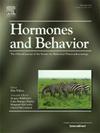空间和语言表现与联合口服避孕药使用的持续时间有关,但在无药间隔期间没有变化
IF 2.4
3区 医学
Q2 BEHAVIORAL SCIENCES
引用次数: 0
摘要
研究背景:多巴胺激素和睾酮与语言和空间处理有关。全世界约有1.5亿妇女长期服用口服避孕药。迄今为止,关于COCs对认知的长期影响的文献很少,结果和方法也不一致。在这篇文章中,我们研究了语言和空间表现是否在短期激素停药期间发生变化(i)和(ii)与coc使用时间有关。我们评估了黄体酮类型(雄激素性)和任务复杂性的调节作用。方法180名受试者(60名雄激素coc服用者、60名抗雄激素coc服用者和60名有月经周期的非服用者)分别在药物活性期/黄体期和停药期/月经期进行一次检测。我们比较了COC服用者在服药暂停和主动服药阶段的心理旋转、导航和语言流畅性表现,并评估了与自然月经周期女性月经周期波动相比的差异。结果长期服用者在心理旋转、导航和语言流畅性方面,主动服药与停药无显著差异。无论coc处于哪个阶段,雄激素coc使用者比非雄激素coc使用者和非雄激素coc使用者表现出更高的定向精度。较长的服药时间与coc使用者更好的定向准确性和减少音位词和转换产生有关,而不依赖于避孕药的雄激素性。结论在无药间隔内无短期变化的情况下,语言和空间表现与COC使用时间的关系可能提示长期使用COC对空间和语言加工的累积效应。本文章由计算机程序翻译,如有差异,请以英文原文为准。
Spatial and verbal performance relate to the duration of combined oral contraceptive use but do not change during the pill-free interval
Background
Ovarian hormones and testosterone have been related to verbal and spatial processing. Oral contraceptives are taken by approximately 150 million women worldwide often for extended time periods. To date, the literature on long-term effects of COCs on cognition is sparse, and results and methodology are inconsistent.
Objectives
In this manuscript we examined whether verbal and spatial performance changed (i) during short-term hormonal withdrawal as during the monthly pill pause and (ii) related to the duration of COC-use. We assessed the moderating effects of progestin type (androgenicity) and task complexity.
Methods
180 participants (60 androgenic COC-users, 60 anti-androgenic COC-users and 60 non-users with a menstrual cycle) were tested once during their active pill phase/luteal phase and once during their pill pause/menses. We compared mental rotation, navigation and verbal fluency performance between the pill pause and active intake phase in COC users and assessed how the differences compared to fluctuations along the menstrual cycle in naturally cycling women.
Results
No differences between active pill intake and pill pause were found in mental rotation, navigation or verbal fluency in long-term users. Irrespective of COC-phase, androgenic COC-users demonstrated higher orientation accuracy compared to anti-androgenic COC-users and non-users. Longer pill duration was associated with better orientation accuracy and decreased phonemic word and switching production in COC-users independent of the pill's androgenicity.
Conclusion
The association of verbal and spatial performance to COC use duration in the absence of short-term changes during the pill-free interval may hint at cumulative effects of long-term COC-use on spatial and verbal processing.
求助全文
通过发布文献求助,成功后即可免费获取论文全文。
去求助
来源期刊

Hormones and Behavior
医学-行为科学
CiteScore
6.70
自引率
8.60%
发文量
139
审稿时长
91 days
期刊介绍:
Hormones and Behavior publishes original research articles, reviews and special issues concerning hormone-brain-behavior relationships, broadly defined. The journal''s scope ranges from laboratory and field studies concerning neuroendocrine as well as endocrine mechanisms controlling the development or adult expression of behavior to studies concerning the environmental control and evolutionary significance of hormone-behavior relationships. The journal welcomes studies conducted on species ranging from invertebrates to mammals, including humans.
 求助内容:
求助内容: 应助结果提醒方式:
应助结果提醒方式:


